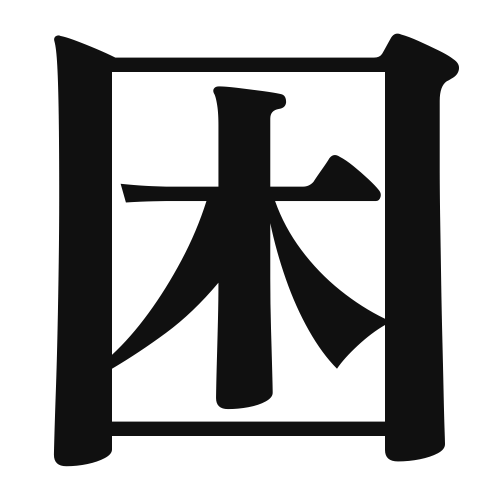1. Overview of Meaning
The kanji “困” (kon) means “to be troubled” or “to be in a difficult situation.” It conveys a sense of being stuck or facing challenges that are hard to overcome.
2. Formation and Radical
Formation of the Kanji: The kanji “困” is a compound character that combines elements to convey its meaning. It consists of the radical for “tree” (木) and the character for “difficult” (囗), symbolizing a person surrounded by trees, representing obstacles or troubles.
Radical: The radical of “困” is “囗” (enclosure), which often relates to being surrounded or enclosed by something, further emphasizing the feeling of being trapped or troubled.
3. Examples of Usage
Common Words and Phrases:
- 困難 (こんなん, konnan) – difficulty, hardship
- 困惑 (こんわく, konwaku) – confusion, bewilderment
Example Sentences in Daily Conversation:
- 今、私は困っています。 (I am in trouble right now.)
- この問題は困難です。 (This problem is difficult.)
4. Synonyms and Antonyms
Similar Kanji:
- 難 (なん, nan) – difficulty; it emphasizes the challenge itself rather than the feeling of being troubled.
- 苦 (く, ku) – suffering; it focuses more on pain or distress rather than the situation of being stuck.
Antonyms:
- 解決 (かいけつ, kaiketsu) – resolution; it means to solve or resolve a problem, the opposite of being troubled.
- 楽 (らく, raku) – comfort; it signifies ease or comfort, contrasting with the feeling of being in trouble.
5. Cultural and Historical Background
Relation to Japanese Culture: The kanji “困” is often used in contexts discussing challenges in life, reflecting the Japanese cultural value of perseverance in the face of adversity.
Proverbs and Idioms:
- 困った時の神頼み (こまったときのかみだのみ, komatta toki no kami-danomi) – “Praying to God in times of trouble,” which emphasizes seeking help when in difficult situations.
